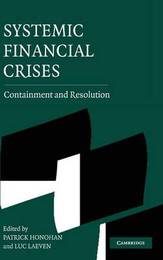
|
Systemic Financial Crises: Containment and Resolution
Hardback
Main Details
| Title |
Systemic Financial Crises: Containment and Resolution
|
| Authors and Contributors |
Edited by Patrick Honohan
|
|
Edited by Luc Laeven
|
| Physical Properties |
| Format:Hardback | | Pages:400 | | Dimensions(mm): Height 236,Width 163 |
|
| Category/Genre | Finance |
|---|
| ISBN/Barcode |
9780521851855
|
| Classifications | Dewey:332 |
|---|
| Audience | | Professional & Vocational | |
|---|
|
Publishing Details |
| Publisher |
Cambridge University Press
|
| Imprint |
Cambridge University Press
|
| Publication Date |
26 September 2005 |
| Publication Country |
United Kingdom
|
Description
Faced with a systemic financial sector crisis, policymakers need to make difficult choices under pressure. Based on the experience of many countries in recent years, few have been able to achieve a speedy, lasting and low-cost resolution. This volume considers the strengths and weaknesses of the various policy options, covering both microeconomic (including recapitalization of banks, bank closures, subsidies for distressed borrowers, capital adequacy rules and corporate governance and bankruptcy law requirements) and macroeconomic (including monetary and fiscal policy) dimensions. The contributors explore the important but little understood trade-offs that are involved, such as between policies which take effect quickly, those which minimize long-term fiscal and economic costs, and those which create favorable incentives for future stability. Successfully implementing crisis management and crisis resolution policy required attention to detail and a good flow of information.
Author Biography
Patrick Honohan is a Senior Financial Policy Advisor at the World Bank. Previously he was Economic Advisor to the Taoiseach (Irish Prime Minister) and spent several years as Professor at the Economic and Social Researcg Institute, Dublin, and at the Central Bank of Ireland. Dr Honohan has published widely on macroeconomics and monetary and financial sector issues ranging from exchange rate regimes and purchasing-power parity, to migration, cost-benefit analysis and statistical methodology. Based in Dublin, he is a Member of the Royal Irish Academy and a Research Fellow of the Centre for Economic Policy Research, London. He coedited Financial Liberalization: How Far, How Fast? (Cambridge University Press, 2001) with Gerard Caprio and Nobel Laureate Joseph Stiglitz. Luc Laeven is a Senior Financial Economist at the World Bank. He has participated in several financial and private sector operations of the World Bank, focusing on the development of banking systems and corporate sectors. His research focuses on international banking and corporate finance issues and has been published in numerous books and academic journals, including the Journal of Finance, the Journal of Money, Credit, and Banking, the Journal of Financial Intermediation, and the Journal of Banking and Finance. He is an Extramural Fellow at Tilburg University and a Research Affiliate in the Financial Economics Programme of the Centre for Economic Policy Research in London.
Reviews"After three decades in which domestic financial crises were few and far between, they returned with a vengeance between 1980 and 2000. This book distills the wisdom of officials who have had to cope with such cases and academics who have studied them. Everyone who might become involved in such a crisis, as actor or commentator or victim, should read it, and soon. One of the foremost lessons is that there is a need to take quick, decisive action when a crisis first hits. I recommend especially the contributions on 'Pitfalls in Managing Closures' and the controversial model 'Policies for Banking Closures'." -Charles Goodhart, London School of Economics "This is an important book on an important subject. It documents what crisis experience has to teach us and why it is maddeningly difficult to put these lessons into practice. " - Edward Kane, Boston College "A valuable analysis of what has been learned about containing and resolving systemic financial crises." - Morris Goldstein, Institute for International Economics, Washington, DC
|